Donald Trump
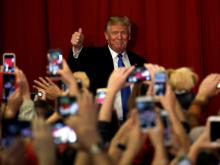
Donald Trump is moving quickly to rally the evangelical base of the Republican Party as the presumptive GOP presidential nominee pivots toward a general election contest where the conservative Christian vote will be crucial to his chances for winning the White House.
The brash New York real estate developer has been reviled by many evangelical Christian leaders but he retains a significant appeal with grass-roots evangelicals and is increasingly winning over some leading conservative Christian activists.
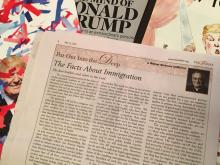
The Roman Catholic bishop of Brooklyn, one of the largest and most diverse dioceses in the U.S., is defending immigrants in a powerful essay that — without mentioning names — seems to take direct aim at Donald Trump and his supporters by ripping the “racist and xenophobic tendencies” in society and arguing that immigration in fact helps the economy.

As you likely know, faith-based organizations don’t endorse candidates. So you won’t be surprised that I am not going to endorse Donald Trump — neither will I endorse his Democratic opponents, Hillary Clinton or Bernie Sanders. But we faith leaders will comment on the morality of this presidential campaign, the issues raised or not raised, and the morality of candidates based on our moral values. That’s what we “values voters” do. And we will again this election year.
Of course, Trump took notice and attacked, in one of his regularly ugly tweets, calling Dr. Russell Moore a “truly a terrible representative of Evangelicals and all of the good they stand for. A nasty guy with no heart!"
Well, Donald, many of us are right with Russell on this, and you will face strong opposition to your political use of racial bigotry from Christians across the political spectrum. If you had the courage to join a public forum with us faith leaders on the terrible dangers of racial bigotry in a time of such division and fear, it could be very good for the country.
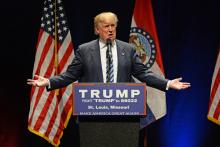
An Indiana evangelical leader says he and other Christians are in an “untenable situation” after Senator Ted Cruz’s withdrawal from the 2016 presidential race.
Speaking on NPR’s Morning Edition program, Ron Johnson Jr., head of the Indiana Pastors Alliance, could not explain why 50 percent of Indiana’s evangelicals voted for Donald Trump, according to exit polls.

Invoking the call of German theologian Dietrich Bonhoeffer, more than 50 faith leaders from across the political spectrum joined together today to speak out on the current state and alarming rhetoric of the 2016 election cycle, which they say, “threaten[s] the fundamental integrity of Christian faith and the well-being of society itself.”
The statement, “Called to Resist Bigotry — A Statement of Faithful Obedience,” names the racial and religious bigotry of Donald Trump and his disrespect of women as gospel issues, and not merely political matters, saying: “… while Donald Trump certainly did not start these long-standing American racial sins, he is bringing our nation’s worst instincts to the political surface, making overt what is often covert, explicit what is often implicit."
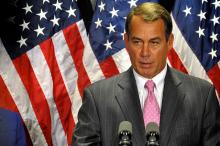
Former Speaker of the House John Boehner visited Stanford on April 27 to chat about his time in Washington, D.C., but the conversation quickly turned to what he thinks of the current Republican presidential candidates.

1. Trump’s Bible Fail: He Names His Favorite Verse But Doesn’t Understand It
He named a concept, not so much a verse in particular. And other problems …
2. What Does Freddie Gray Mean to You?
“One year after the death of Freddie Gray, The Baltimore Sunasked city leaders and residents what Freddie Gray means to them.”
3. Why Didn’t Houston Face Backlash for HERO’s Repeal?
“… the fact that Houston skated away from any kind of meaningful backlash [for repealing Houston’s Equal Rights Ordinance] is surprising. Residents of Charlotte are being punished because of the actions of their governor and state legislature, but the people of Houston are not being singled out for their own vote.”
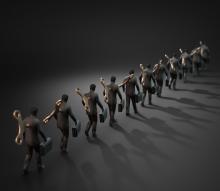
It is not a particular religious or political set of values or ideology that is the heart of the problem here. Authoritarianism goes beyond political or religious affiliation.
Given authoritarianism's penchant for enforcing its will through the means of coercion and force, at the expense of religious and civil liberties, it is vital for those who identify with these groups to recognize this, and the very real danger that this poses.
It is not enough for progressive evangelicals and political liberals or even moderates to speak out. Conservative politicians and religious leaders alike need to recognize the very real danger of authoritarianism, and find the moral courage to speak out against it.

Donald Trump sparked outrage across the ideological spectrum with a call to punish women who obtain abortions if the procedure is banned. Later, however, Trump clarified his position, saying in a campaign statement that, if abortion is banned, “the doctor or any other person performing this illegal act upon a woman would be held legally responsible, not the woman. The woman is a victim in this case as is the life in her womb.”

The 2016 Republican presidential campaign boils with anti-immigrant rhetoric but candidates’ harsh proposals don’t resonate with most Americans, particularly religious believers and young adults.
A new analysis by the Public Religion Research Institute, released March 29 finds that many reject harsh proposals such as building a wall along the U.S.-Mexico border and deporting millions of undocumented immigrants, said Dan Cox, director of research for PRRI.

We must resist the terrible teachings of Donald Trump
This week, as Christians mark the crucifixion and resurrection of Jesus, we find ourselves traveling from the darkness of Good Friday into the light and joy of Easter Sunday.

Terrorists want to “terrorize” us. They want to make us angry and hostile. They want us to react and overreact to them. They want us to suspect, to racially and religiously profile, discriminate against, and attack all Muslims. Because that will help the terrorists recruit more young Muslims to their cause — and make it harder for other Muslims to work against them. They want to politicize everything and turn people’s attention away from the massive losses for human life that these evil terrorists represent.
We must deny them their victory. Here’s how.

Nearly everyone I know believes that one or more of the presidential candidates is an exceptionally bad leader, and this leaves us to grapple with why so many of our fellow Americans support them. Personally, I reject public stupidity as an explanation for anything. Our people deserve a more generous attempt to understand them. So let us look deeper.
Three protestors — two white, one Latina — were arrested March 19 for chaining themselves to cars and blocking traffic headed to a Donald Trump rally, reports .Mic.
Of the three, only one was transferred to Immigration and Customs Enforcement (ICE) to investigate her legal status. And guess which one it was.

More than 50 conservative Catholic activists and political leaders have come out in support of Republican presidential hopeful Ted Cruz in an effort to shore up Catholic backing for Cruz as an alternative to Donald Trump. Among them is a priest from South Carolina who may be skirting the edges of his own church’s policies against clerics becoming involved in politics.
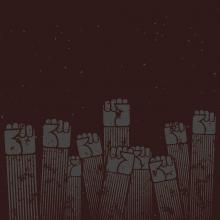
In today’s political climate we’re witnessing plenty of protesting — there is indeed much to protest. But some Christians, particularly in evangelical circles, believe protesting is sinful, that it’s only something that young, uneducated, unemployed, liberal fools do just for the sake of causing trouble.

The hacker collective known as "Anonymous" is taking on Donald Trump. Anonymous released a video in which a spokesman, wearing their trademark Guy Fawkes mask, calls on all hackers to “dismantle his [Donald Trump’s] campaign and sabotage his brand.”
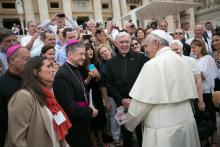
The morning after a Chicago rally for Donald Trump was canceled for fear of violence, the city’s Catholic archbishop warned that “enmity and animosity” are hallmarks of today’s politics and a “cancer” that is threatening the nation’s civic health.
“Our nation seems to have lost a sense of the importance of cultivating friendships as fellow citizens who, being equal, share much in common,” Archbishop Blase Cupich said in a homily March 12 at Old St. Patrick’s Church.